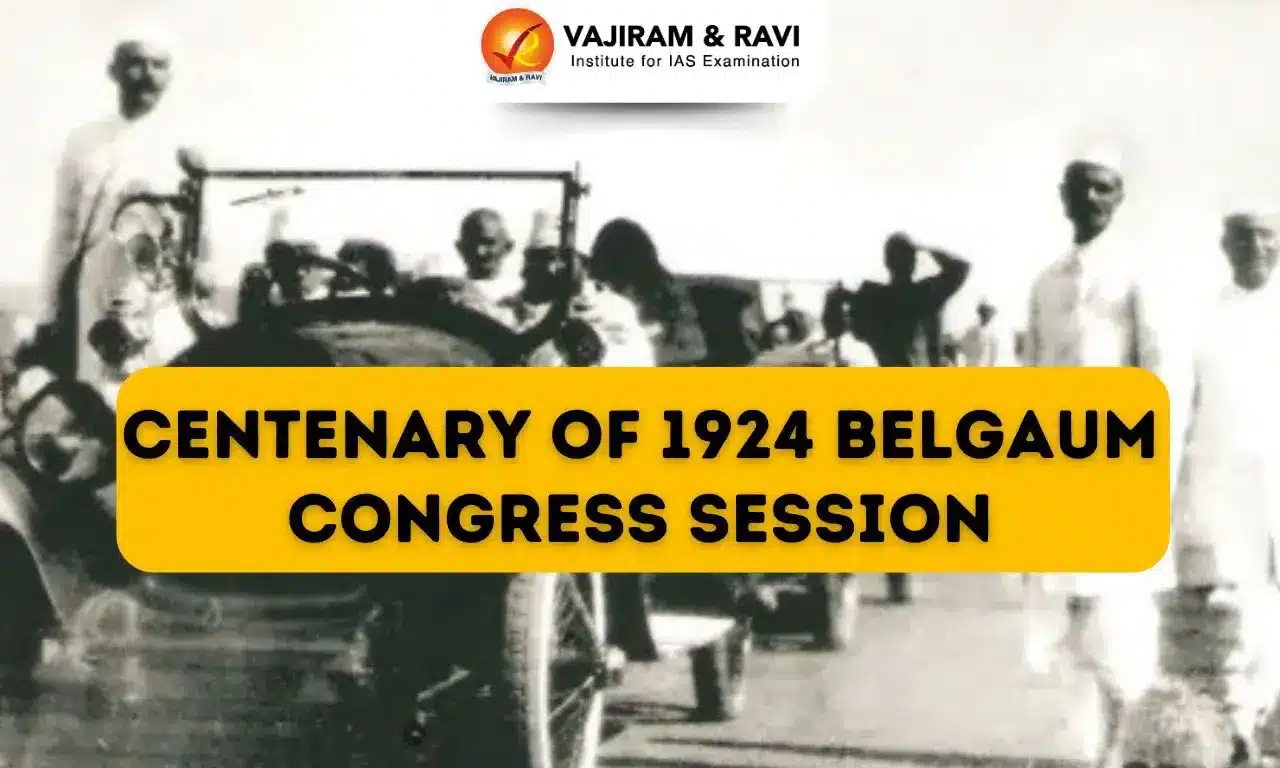What’s in today’s article?
- Why in News?
- 1924 session
Why in News?
The Congress is organizing a two-day event in Belagavi (previously Belgaum), Karnataka, on December 26-27 to mark the centenary of Mahatma Gandhi presiding over its historic Belgaum session in 1924.
The event includes an extended session of the Congress Working Committee (CWC) and a rally.
1924 session
- Backdrop against which 1924 Belgaum Session was held
- After his release from prison in February 1924, Mahatma Gandhi was troubled by the lack of Hindu-Muslim unity in the freedom struggle and Congress factionalism.
- Mahatma Gandhi was in prison in February 1924 for his involvement in the Non-Cooperation Movement against British rule.
- He was arrested in 1922 on charges of sedition for writing three articles in Young India that criticized British policies.
- Gandhi was sentenced to six years in prison but was released early in February 1924 after serving about two years due to health concerns.
- To address these issues, he undertook a 21-day fast from September 18 to October 8 that year.
- Participants in the 1924 Congress session
- The session was attended by several senior Congress leaders including Jawaharlal Nehru, Sardar Vallabhbhai Patel, Sarojini Naidu, and Khilafat movement leaders Muhammad Ali Jauhar and Shaukat Ali, among others.
- Significance of 1924 Session
- Mahatma Gandhi presided over the 1924 Congress session in the erstwhile Bombay state, marking the only time he held the position of Congress president.
- During this session, Gandhi presented his ideas on non-violence, communal harmony, and “swaraj” (self-rule).
- He served as the Congress president from December 1924 to April 1925.
- Gandhi’s message to the 1924 conclave
- Gandhi on Non-Violence and Non-Cooperation Movement
- Mahatma Gandhi discussed his philosophy of non-violence.
- He explained that although the Non-Cooperation Movement was called off in 1922 after the Chauri Chaura incident, it had been an effective strategy for India’s path to independence.
- He highlighted that the boycotts, such as those of government institutions and foreign cloth, were not fully successful but had reduced the prestige of these institutions.
- Gandhi emphasized that non-violence, rather than revolutionary violence, was a more effective force for change, as it came from goodwill and gentleness.
- Hindu-Muslim Unity and Untouchability
- Gandhi stressed that the removal of untouchability was as essential for swaraj (self-rule) as Hindu-Muslim unity.
- He argued that Hindus could not claim swaraj until they restored the liberty of the suppressed classes, underscoring the importance of social reform in the freedom struggle.
- Self-Rule and Reforms
- Gandhi suggested reforms to achieve swaraj, including moving the final court of appeals from London to Delhi and adopting Hindustani as the official language in provincial governments and courts.
- He urged the people to become “perfect satyagrahis,” emphasizing that satyagraha (non-violent resistance) was an attainable quality for all, vital for achieving truth and justice.
- Khadi and Self-Reliance
- Gandhi called on the masses to take up spinning and weaving khadi, asserting that true swaraj could only be achieved when the people embraced self-reliance, symbolized by the use of khadi fabric.
- Impact of 1924 session on the freedom movement
- Historians believe that the session was a step towards the promotion of peasant consciousness.
- This resulted in the spread of khadi with village industries getting traction in Karnataka and other parts of the country.
- It also saw increased participation of peasants in the Congress-led initiatives.
Q.1. Why was Gandhi in prison in 1924?
Gandhi was imprisoned in 1922 for sedition after criticizing British policies in Young India. He was released in 1924 due to health concerns after serving about two years of his six-year sentence.
Q.2. What was the significance of the 1924 Belgaum Session?
The session marked Gandhi’s only term as Congress president, where he emphasized non-violence, Hindu-Muslim unity, and self-rule. It influenced social reforms, including the spread of khadi and increased peasant participation in the independence movement.
Source: IE
Last updated on Dec 26, 2024
→ UPSC Civil Services 2024 Interview Schedule has been released on 21st December 2024. As per the schedule, the UPSC CSE interviews will be held from January 7 to April 17, 2025.
→ The UPSC Civil Services Notification 2024 was released for 1056 vacancies.
→ Candidates who have completed graduation are eligible for the exam.
→ The candidates are required to go through a 3 stage selection process - Prelims, Main and Interview.
→ Go through the UPSC Previous Year Papers and UPSC Civil Services Test Series to enhance your preparation.
Tags: centenary of 1924 belgaum congress session mains articles upsc current affairs upsc mains current affairs





